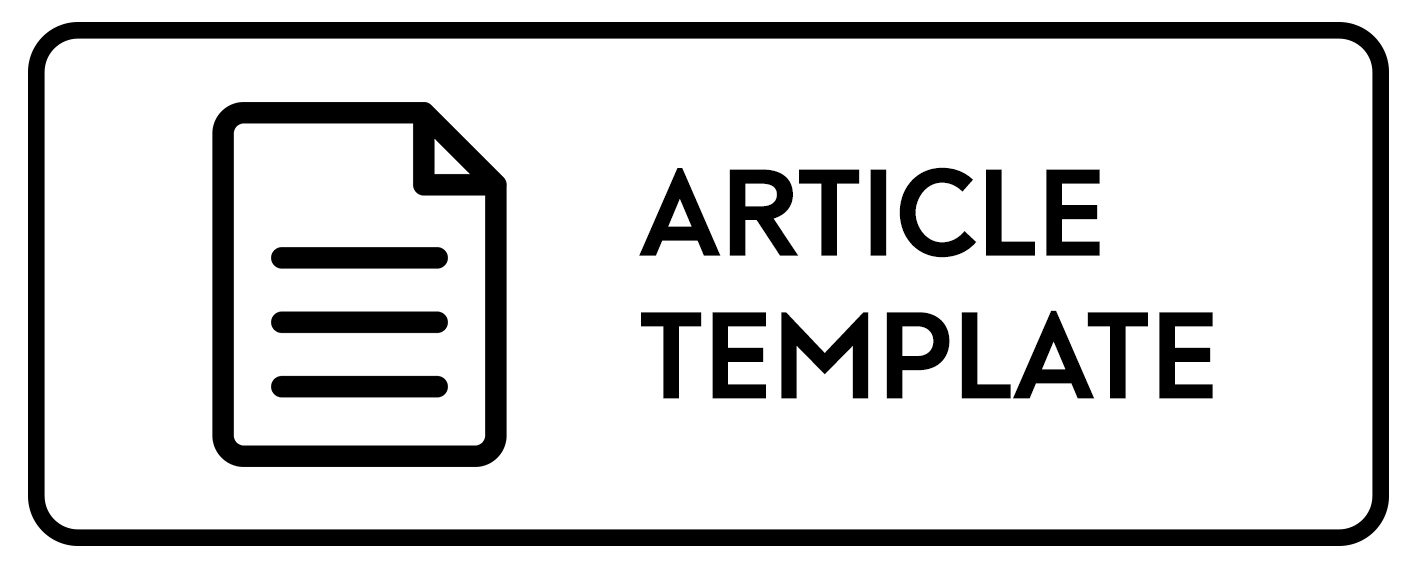INFRASTRUCTURE DEVELOPMENT: POLITENESS STRATEGY IN THE SPEECH OF THE INDONESIAN PRESIDENT, JOKOWI.
Abstract
Keywords
Full Text:
PDF BAHASA INGGRISReferences
Abdurahman, A., & Manaf, N. A. (2019). Realization of Negative Politeness Strategy on Speech Act of Questions and Answers in the Learning Processes. Advances in Social Science, Education and Humanitities Research, September. https://doi.org/10.2991/icla-18.2019.103
Abudayeh, H., & Dubbati, B. (2020). Politeness strategies in translating Donald Trump’s offensive language into Arabic. Perspectives: Studies in Translation Theory and Practice, 28(3), 424–439. https://doi.org/10.1080/0907676X.2019.1709514
Alavidze, M. (2018). Politeness in President Donald Trump’s Speeches. International Journal of Multidisciplinary Thought, 7(3), 119–126.
Angelina, D., & Wahyuni, K. T. (2021). Pengaruh Infrastruktur Ekonomi dan Sosial terhadap Pertumbuhan Ekonomi Indonesia, 2015-2019. Seminar Nasional Official Statistics, 2021(1), 733–742. https://doi.org/10.34123/semnasoffstat.v2021i1.1025
Bengsch, G. (2010). The Influence of Culture on the Perception of Politeness : An Investigation of front-line Staff at a mid-priced Hotel Chain in New Zealand.
Brown, P., & Levinson, S. C. (1987). Politeness: Some Universals in Language Usage (Studies in Interactional Sociolinguistics 4). In Cambridge University Press. https://doi.org/10.2307/3587263
Bowen, G. A. (2009). Document analysis as a qualitative research method. Qualitative Research Journal, 9(2), 27–40. https://doi.org/10.3316/QRJ0902027
Chai, L. S., Siop, S., Putit, Z., Lim, L., Gunggu, A., & Tie, S. F. (2020). Translation, adaptation, and validation of the malay version of the cardiac rehabilitation barriers scale. Journal of Nursing Research, 28(1), 1–9. https://doi.org/10.1097/jnr.0000000000000328
Colarossi, N. (2020). 11 times Trump has lashed out at reported during COVID-19 Briefings. Business Insider.
Collinson, S. (2020). Trump turns angry and defensive as evidence contradicts his coronavirus narrative. CNN.
Corbin, J., & Strauss, A. (2008). Basics of Qualitative Research (3rd ed.): Techniques and Procedures for Developing Grounded Theory. In Thosand Oaks; SAGE Publications Inc. https://doi.org/10.4135/9781452230153
Culpeper, J. (2011). Politeness and Impoliteness. In Handbooks of Pragmatics (Vol. 5, pp. 391–394). https://doi.org/10.4324/9781003010043-5
Dunham, W. (2020). Brash and pugnacious , Trump has presided over a tumultuous presidency. The Star.
Grice, H. P. (1975). Logic and Conversation (pp. 41–58). New To
Hastangka, H. (2021). Doktrin Filsafat Politik Jokowi Dan Janji Nawacita (Mengurai Gagasan Revolusi Mental). Jurnal Pancasila, 1(2), 39–44.
Kuzhevskaya, E. B. (2019). Politeness strategies in business english discourse. Training, Language and Culture, 3(4), 36–46. https://doi.org/10.29366/2019tlc.3.4.4
Maros, M., & Rosli, L. (2017). Politeness strategies in twitter updates of female english language studies Malaysian undergraduates. 3L: Language, Linguistics, Literature, 23(1), 132–149. https://doi.org/10.17576/3L-2017-2301-10
Megah, S. I., & Soframi, G. P. (2020). Trump’s strategies in his speech: A politeness strategies approach. Cahaya Pendidikan, 6(1), 1–12. https://www.journal.unrika.ac.id/index.php/journalcahayapendidikan/article/view/2348
Kusuma, A. (2014). Politeness Strategies in Barack Obama’s Speech in Democratic National Convention 2012.
Leech, G. N. (1983). Principles of Pragmatics. London:Essex:Longman
Najeeb, Z. M., Maros, M., & Mohd Nor, N. F. (2012). Politeness in e-mails of Arab students in Malaysia. GEMA Online Journal of Language Studies, 12(1), 125–145
Njuki, E., Ireri, H. K. (2021). Positive and Negative Politeness Strategies Used by Kenya’s Members of National Assembly. Scientific Research An Academic Publisher. DOI: 10.4236/oalib.1107690
Prasetyo, B., Rustono, R., Pristiwanti, R. (2020). The Use of Politeness Strategies in the Indonesia’s 2019 Presidential Campaign Teams on Online News Media. The 5th International Conference on Science, Education and Technology. ISET 2019. http://dx.doi.org/10.4108/eai.29-6-2019.2290357
Salim, W., & Negara, S. D. (2019). 9. Infrastructure Development under the Jokowi Administration: Progress, Challenges and Policies. In The Indonesian Economy in Transition (pp. 239–265). ISEAS Publishing. https://www.degruyter.com/document/doi/10.1355/9789814843102- 012/html
Saragih, M. W. (2020). The Relevance Of Trisakti Soekarno Concept With Nawacita In Jokowi-Jk Government. International Journal on Social Science, Economics and Art, 10(2), 66–78. https://doi.org/10.35335/ijosea.v10i2.15
Sibarani, J. G., & Marlina, L. (2018). Politeness Strategy used in Republican Debate by Donald trump. EJournal of English Language & Literatyre, 7(4), 531–535. http://ejournal.unp.ac.id/index.php/ell/article/view/102007
Soleman, M., & Noer, M. (2017). NAWACITA SEBAGAI STRATEGI KHUSUS JOKOWI PERIODE OKTOBER 2014-20 OKTOBER 2015. POLITIK, 13(1), Article 1. http://journal.unas.ac.id/politik/article/view/236
Sousa, V. D., & Rojjanasrirat, W. (2011). Translation, adaptation and validation of instruments or scales for use in cross-cultural health care research: A clear and user-friendly guideline. Journal of Evaluation in Clinical Practice, 17(2), 268–274. https://doi.org/10.1111/j.1365-2753.2010.01434.x
Susanti, R., Anwar, Y., Ermayanti, E. (2019). Implementation of learning based on scientific approach to improve science process skills of biology education students in general biology course. Journal of Physics Conference Series 1166(1):012004. DOI:10.1088/1742-6596/1166/1/012004
Tao, L. (2017). Face Perception in Chinese and Japanese. Intercultural Communication Studies, 26(1), 151– 167.
Wahyuningsih, S. (2018). A Discourse Analysis Personal Pronouns in Donald Trump’s Inauguration Speech. 2nd English Language and Literature International Conference (ELLiC), 2, 346–350. http://103.97.100.145/index.php/ELLIC/article/view/3553
DOI: http://dx.doi.org/10.30872/calls.v9i2.12230
Copyright (c) 2023 Ema Eliyana

This work is licensed under a Creative Commons Attribution-ShareAlike 4.0 International License.
Editorial address:
Fakultas Ilmu Budaya, Universitas Mulawarman
Address: Jl. Ki Hajar Dewantara, Gunung Kelua, Kec. Samarinda Ulu, Kota Samarinda, Kalimantan Timur, Indonesia 75123
Email: jurnalcalls@fib.unmul.ac.id
Website: http://e-journals.unmul.ac.id/index.php/CALLS

CaLLs: Journal of Culture, Arts, Literature, and Linguistics site is licensed under a Creative Commons Attribution-ShareAlike 4.0 International License
CaLLs: Journal of Culture, Arts, Literature, and Linguistics indexing by:














